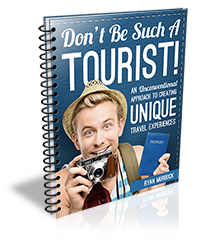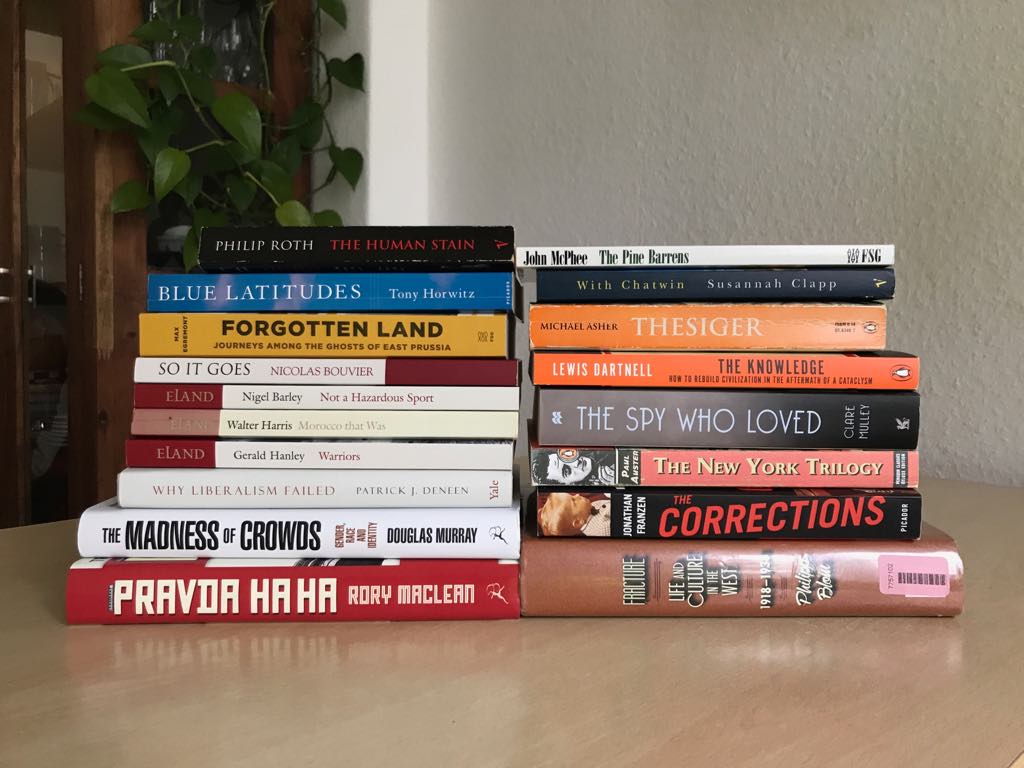
It’s that time again.
I typically read around 100 books a year. Everything from travel literature to poetry, history, psychology, fiction and memoir.
I love reading lists, and I bet you do, too. As each year comes to a close, and as dark Berlin huddles beneath grey skies, I like to take a moment to share my top reads from the past twelve months.
They made my list because they were either memorable, important, or just thoroughly enjoyable. Some are current, some were older, and each is worth your time. I hope you’ll track them down.
Travel literature was big again this year. I came across so many great books that it was difficult to narrow it down to just a few. You’ll notice many Eland titles among them.
Here are the books that got my Road Wisdom Stamp of Approval in 2019, from one book lover to another.
First up, my Top Pick of the Year. This might just be the most important book I read in 2019…
The Madness of Crowds – Douglas Murray [TOP PICK]
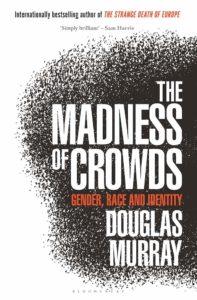
Murray tackles the most divisive — and deranging — issues currently tearing Western countries apart: sexuality, gender, race and trans. He examines the inherent contradictions at the heart of competing rights claims around issues of identity politics, social justice, and ‘intersectionality’, and explores the ways in which they’ve been weaponized in our schools, workplaces and homes in an effort to right perceived wrongs.
Brilliant. Vital. Highly recommended. A voice of sanity in a world gone mad. Get your copy here.
In the category of travel literature…
Pravda Ha Ha by Rory Maclean
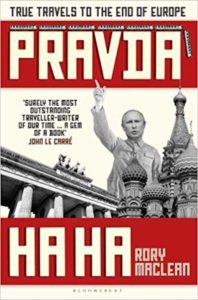
Where were you when the Berlin Wall fell on November 9, 1989?
I was sitting in the back room of our old house watching music videos on TV. I was 17 years old, and glued to MuchMusic — the Canadian version of MTV — when the video stream of shoegazer rock was suddenly replaced by images of people kicking down Europe’s most oppressive border. I knew something in my childhood had changed irrevocably. The world of 99 Red Balloons was all we’d ever known.
My friend Rory Maclean made a journey through Eastern Europe just weeks after the Wall fell, and he captured their newfound freedom in his first book. His latest — Pravda Ha Ha — retraces that journey in reverse 30 years later.
How did we go from Winds of Change to Brexit? From Eastern Europe’s first free elections in half a century to Russian troll factories, populism and Donald Trump? Read his new book right now to find out. And check out this longer review from my blog.
Warriors: Life and Death Among the Somalis by Gerald Hanley
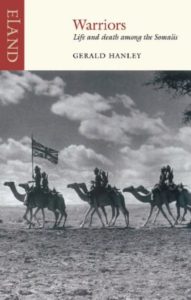
Gerald Hanley spent the Second World War deep in the deserts of Somalia. Under-supplied, poorly equipped, and often alone, save for the detachment of native soldiers under his command, he was tasked with preventing bloodshed between raiding tribes after Italy had been defeated and its colonial administration fell apart.
“Of all the races of Africa,” he writes, “there cannot be one better to live among than the most difficult, the proudest, the bravest, the vainest, the most merciless, the friendliest: the Somalis.”
Driven by an intense curiosity, Hanley comes to understand the people he’s living amongst, their love of fighting, their system of honour, and the complicated network of tribes that roamed a vast wasteland, a place that drove many of his other colleagues around the bend to despair, madness, burnout and suicide.
‘Warriors’ tells the tale of those adventures, but is also a profound meditation on solitude. “In solitude,” he writes, “a man can think upon death with as much pleasure as upon life, and it is in solitude that one can best understand that there is no solution, except to try and do as little harm as possible while we are here, that there is no losing and no winning, no real end to greed or lust, because the human appetite for novelty can only be fully satisfied by death.”
This is one of those stories that stays with you long after you turn the last page. Hanley deserves to be more widely read today. Get your copy here.
The Pine Barrens by John McPhee
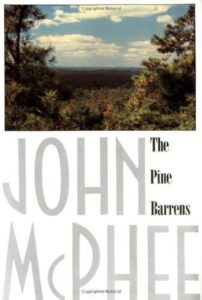
A wonderful read. This really reminded me of those long-vanished communities around my hometown. Like that strange flat area in the trees near the main railway line in the woods behind my grandmother’s house, where there was once a town. And woodland tracks to nowhere, old rubbish piles, and foundations from old buildings that Rob Wilson and I found camping back of Buckwheat Road in high school. Some of the characters McPhee describes remind me of my hometown, too. Get your copy here.
So It Goes by Nicolas Bouvier

Nicolas Bouvier is one of those legends whose name circulates among travelers, but few of my North American friends had ever heard of him, or his classic road trip book, The Way of the World. He was a writer of rare curiosity, with a gift for capturing landscapes and people.
This wonderful new collection contains some of his last remaining untranslated work. It’s filled with imagery of great subtlety and originality, the sort that had me turning down the corners of pages over and over to mark a passage, or stopping to read a section aloud. I know you’re going to enjoy it. Check out the full review on my blog, and get your copy here.
Not a Hazardous Sport by Nigel Barley
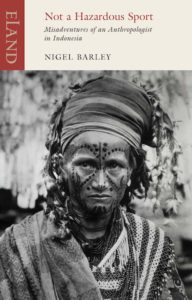
According to insurance companies, anthropology is not a hazardous sport. Perhaps they’d reconsider if they knew what was involved.
I think you’re really going to enjoy this book. The final chapter is a comic masterpiece.
Barley has really hit his stride in this final volume of his Innocent Anthropologist trilogy. His writing is perfectly polished, he’s honed in on his style, and every image is infused with humour and originality. I posted a full review on my blog. Check it out, and get your copy here.
Forgotten Land: Journeys Among the Ghosts of East Prussia by Max Egremont
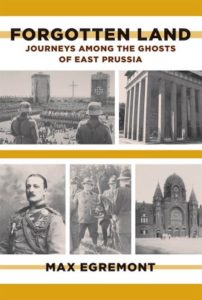
I really enjoyed this one. It brought back memories of the Curonian Spit, that magical landscape of soft light and cold waves, lost on the eastern side of the Baltic Sea. And it added layers of history and personal stories to a fascinating land of shifting borders, a part of Europe forever caught between nations and peoples. A visit to Kaliningrad is now much higher on my list. Get your copy here.
Morocco That Was by Walter Harris
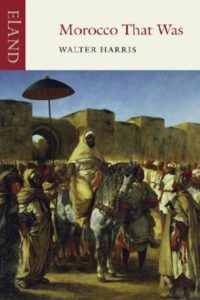
A wonderful first hand account of the author’s 35 years in Morocco in the early 1900’s, where he traveled remote regions, was kidnapped by warlords, and dined with sultans. Perceptive, well observed, and extremely funny. I read this — and 8 or 9 others — to prep for a trip to Morocco over Christmas. This one stood out most. Get your copy here.
Blue Latitudes by Tony Horwitz
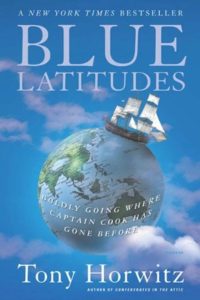
Tony Horwitz tells the tale of Captain James Cook, the explorer who crossed the South Pacific, discovered countless islands including New Zealand, charted the east coast of Australia and discovered the Great Barrier Reef, provided evidence for the existence of a frozen southern continent that no one had yet seen, sailed furthest south in a wooden boat (a record unbroken for a very long time), sailed all the way up to the Bering Strait and Alaska, saw the west coast of BC and Vancouver island, contacted (and was later killed by) the Hawaiians, and made maps and charts so accurate that some were still in use up until 30 or 40 years ago.
Cook’s Pacific travels spanned 3 journeys and just 11 years. He was killed at the age of 50. Not bad for an impoverished, barely educated farm boy from the north of England.
I didn’t realize that, before his Pacific journeys, Cook had also charted and buoyed the St. Lawrence River as a young officer, and helped British forces land troops near Quebec / Plains of Abraham. As he traces the story of Cook’s 3 Pacific journeys, Horwitz visits some of these same places to find out how Cook is remembered today. A thoroughly engaging read. Get your copy here.
In history…..
Fracture: Life and Culture in the West, 1918 – 1938 by Philipp Blom
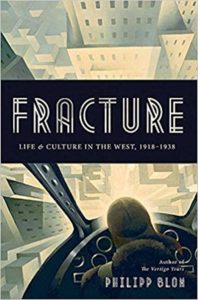
This was a great read. I picked it up on the strength of Blom’s earlier work, The Vertigo Years: Change and Culture in the West 1900 – 1914. I read that years ago, and it was one of those books that stayed in my mind. I often take it down from my shelf to leaf through it, but it never occurred to me until this year to look up the author’s other work. I was very pleased to see this follow up, which extends his analysis to the inter-war years 1918 – 1938. I read it the moment it arrived, and couldn’t put it down. Both books are highly recommended. Get your copy of this one here.
In fiction…
The Human Stain by Philip Roth
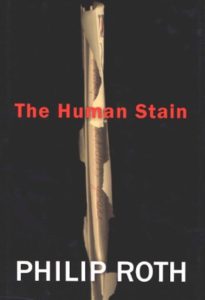
Jesus, what a writer. Published in 2000, but the core conflicts in the novel are still centre stage (and much larger) today: the petty conflicts of academia, issues of race, the hypocrisy of American attitudes towards sexuality, and the way that unfounded accusations can completely destroy a life. Get your copy here.
The Corrections by Jonathan Franzen
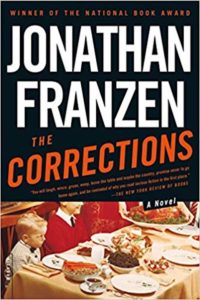
I found the first 100 pages or so were a bit hard to get into, but it sure picked up after that. A thought-provoking story of the failures, secrets, hurts and illusions that every family has, and that we all end up facing eventually. Highly recommended. Get your copy here.
The New York Trilogy by Paul Auster
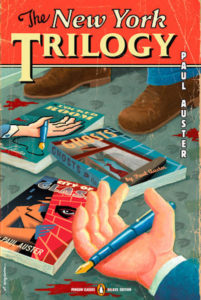
I was going to rate these strange, dark detective stories 4/5 stars, but that moved to 5/5 after reading “The Locked Room”, the third work in this trilogy. It is the story of a writer who couldn’t write, and so instead publishes the work of a friend who disappeared, until he gradually assumes that friend’s life. I couldn’t put that one down. Get your copy here.
And finally, in general nonfiction…
Why Liberalism Failed by Patrick Deneen
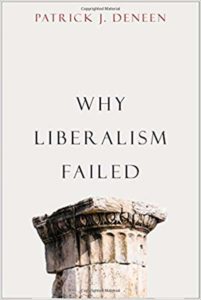
Three ideologies dominated the twentieth century — communism, fascism and liberalism — and liberalism is the last one standing. In this fascinating and thought provoking book, Deenan argues that liberalism is built on a foundation of contradictions — promoting equal rights while creating material inequality, for example, and pushing individual autonomy while giving rise to states that seek to govern every aspect of our lives. He warns that the forces currently tearing Western culture apart are the end result of unopposed liberalism; inherent features of the system, rather than flaws. That the success of this ideology contained within it the seeds of its current failure.
I didn’t find the author’s proposed solutions compelling, but his critiques were on point, and his basic premise was startling — at least, I’d never come across many of them before. A book to spark ideas, and a lot crammed into a couple hundred pages. Get your copy here.
Thesiger by Michael Asher
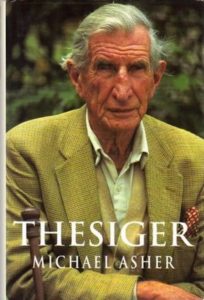
Outstanding biography of the explorer Wilfred Thesiger by desert traveler Michael Asher.
I think it works so well because Asher understands the desert, and treks to many of the same places Thesiger traveled. He captures the paradox of a man who claimed to shun the modern while straddling both contemporary England and the world’s wild places, and manages to keep his distance and write objectively about one of his own travel heroes.
I closed the book with my admiration for Thesiger’s travels and accomplishments intact. And I was surprised to read just how much he traveled, year by year, after Arabia and the Iraqi marshes. But I don’t think I would have liked the man very much, or wanted to hang out with him. Get your copy here.
The Knowledge: How to Rebuild Civilization In The Aftermath of a Cataclysm by Lewis Dartnell
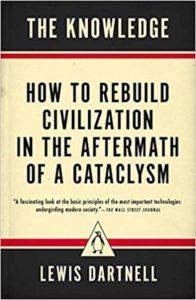
A fascinating read. I don’t know if reading this book will help you rebuild some small corner of civilization for yourself after the coming apocalypse. But I came away with a deep appreciation for all that humanity has achieved in our brief span of existence. Simple chemical transformations, agriculture, electricity, medicine, time keeping… How the fuck did people figure this stuff out? Get your copy here.
The Spy Who Loved by Clare Mulley
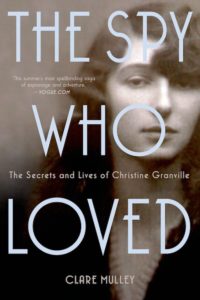
What a remarkable life Christine Granville had. I find it shocking that the story of this brave and resourceful woman isn’t common knowledge. And I was disgusted to read how she was treated by the British government after WWII.
I first heard the story of this remarkable war hero, spy and resistance leader from a BBC Great Lives podcast, and immediately ordered this biography. It’s fascinating and highly recommended, as is this book. Get your copy here.
With Chatwin: Portrait of a Writer by Susannah Clapp
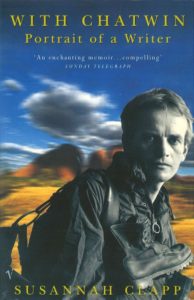
A thoroughly enjoyable little memoir of Bruce Chatwin, by the editor who worked with him on In Patagonia and other books. Get your copy here. And if you’re into Chatwin, you’ll also want to check out the new film about him by Werner Herzog.
So there you have it. My top reads from the past year, narrowed down with great difficulty from a rewarding 12 months of reading.
What stood out for you in 2019?
Please share your best reads of last year in the comments below. I’m always looking for recommendations.
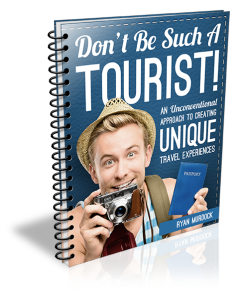
Get your FREE Guide to Creating Unique Travel Experiences today! And get out there and live your dreams...
